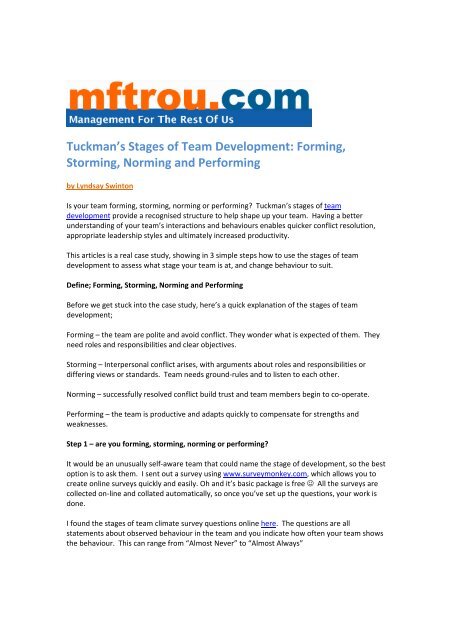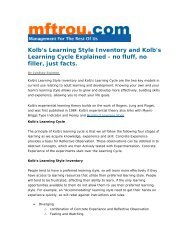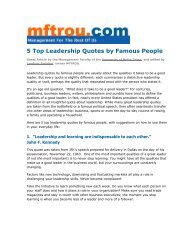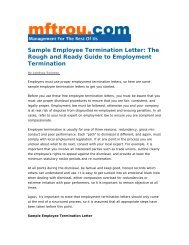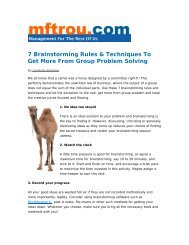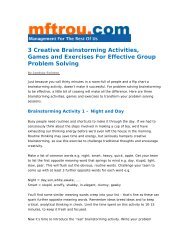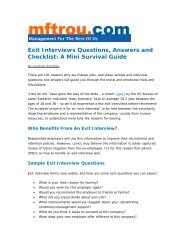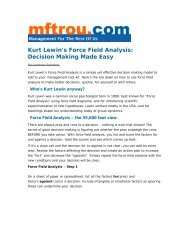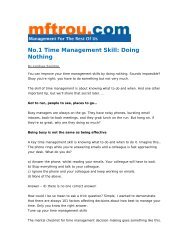Tuckman's Stages of Team Development: Forming, Storming ...
Tuckman's Stages of Team Development: Forming, Storming ...
Tuckman's Stages of Team Development: Forming, Storming ...
Create successful ePaper yourself
Turn your PDF publications into a flip-book with our unique Google optimized e-Paper software.
Tuckman’s <strong>Stages</strong> <strong>of</strong> <strong>Team</strong> <strong>Development</strong>: <strong>Forming</strong>,<br />
<strong>Storming</strong>, Norming and Performing<br />
by Lyndsay Swinton<br />
Is your team forming, storming, norming or performing Tuckman’s stages <strong>of</strong> team<br />
development provide a recognised structure to help shape up your team. Having a better<br />
understanding <strong>of</strong> your team’s interactions and behaviours enables quicker conflict resolution,<br />
appropriate leadership styles and ultimately increased productivity.<br />
This articles is a real case study, showing in 3 simple steps how to use the stages <strong>of</strong> team<br />
development to assess what stage your team is at, and change behaviour to suit.<br />
Define; <strong>Forming</strong>, <strong>Storming</strong>, Norming and Performing<br />
Before we get stuck into the case study, here’s a quick explanation <strong>of</strong> the stages <strong>of</strong> team<br />
development;<br />
<strong>Forming</strong> – the team are polite and avoid conflict. They wonder what is expected <strong>of</strong> them. They<br />
need roles and responsibilities and clear objectives.<br />
<strong>Storming</strong> – Interpersonal conflict arises, with arguments about roles and responsibilities or<br />
differing views or standards. <strong>Team</strong> needs ground‐rules and to listen to each other.<br />
Norming – successfully resolved conflict build trust and team members begin to co‐operate.<br />
Performing – the team is productive and adapts quickly to compensate for strengths and<br />
weaknesses.<br />
Step 1 – are you forming, storming, norming or performing<br />
It would be an unusually self‐aware team that could name the stage <strong>of</strong> development, so the best<br />
option is to ask them. I sent out a survey using www.surveymonkey.com, which allows you to<br />
create online surveys quickly and easily. Oh and it’s basic package is free All the surveys are<br />
collected on‐line and collated automatically, so once you’ve set up the questions, your work is<br />
done.<br />
I found the stages <strong>of</strong> team climate survey questions online here. The questions are all<br />
statements about observed behaviour in the team and you indicate how <strong>of</strong>ten your team shows<br />
the behaviour. This can range from “Almost Never” to “Almost Always”
Here is a snapshot <strong>of</strong> the survey – there are 32 questions in all and it took no more than 10<br />
minutes to fill in.<br />
Each question links back to one <strong>of</strong> the 4 stages <strong>of</strong> team development, and they are mixed up,<br />
making it difficult to tell which stage the question relates to. There are no “right” answers to<br />
the questions, and it is possible to be a highly effective team and display some <strong>of</strong> the less<br />
“mature” behaviours occasionally.<br />
Step 2 ‐ Analyse the results<br />
Survey monkey show the answers to each question as below.<br />
You need a scoring grid to make sense <strong>of</strong> the answers, which I set up in Excel.
Here are the questions and actual results from my team<br />
Question Average <strong>Forming</strong><br />
no. Response<br />
1 4.6 We try to have set procedures or protocols to<br />
ensure that things are orderly and run<br />
smoothly (e.g. minimize interuptions,<br />
everyone gets the opportunity to have their<br />
say).<br />
5 1.7 <strong>Team</strong> members are afraid or do not like to ask<br />
others for help.<br />
10 1.7 <strong>Team</strong> members do not fully trust the other<br />
team members and closely monitor others<br />
who are working on a specific task.<br />
15 4.6 We are trying to define the goal and what<br />
tasks need to be accomplished.
18 3.3 We assign specific roles to team members<br />
(team leader, facilitator, time keeper, note<br />
taker, etc.).<br />
21 1.6 There are many abstract discussions <strong>of</strong> the<br />
concepts and issues, which make some<br />
members impatient with these discussions.<br />
27 1.6 It seems as if little is being accomplished with<br />
the project's goals.<br />
29 4.4 Although we are not fully sure <strong>of</strong> the project's<br />
goals and issues, we are excited and proud to<br />
be on the team.<br />
<strong>Storming</strong><br />
<strong>Storming</strong><br />
2 4.3 We are quick to get on with the task on hand<br />
and do not spend too much time in the<br />
planning stage.<br />
7 4.6 The team leader tries to keep order and<br />
contributes to the task at hand.<br />
9 1.7 We generate lots <strong>of</strong> ideas, but we do not use<br />
many because we fail to listen to them and<br />
reject them without fully understanding<br />
them.<br />
16 1.1 Many <strong>of</strong> the team members have their own<br />
ideas about the process and personal agendas<br />
are rampant.<br />
20 1.7 The tasks are very different from what we<br />
imagined and seem very difficult to<br />
accomplish.<br />
23 2.0 We argue a lot even though we agree on the<br />
real issues.<br />
28 1.4 The goals we have established seem<br />
unrealistic.<br />
31 1.4 There is a lot <strong>of</strong> resisting <strong>of</strong> the tasks on hand<br />
and quality improvement approaches.<br />
Norming<br />
Norming<br />
4 4.3 We have thorough procedures for agreeing<br />
on our objectives and planning the way we<br />
will perform our tasks.<br />
6 4.3 We take our team's goals and objectives<br />
literally, and assume a shared understanding.<br />
11 4.4 The team leader ensures that we follow the<br />
procedures, do not argue, do not interrupt,<br />
and keep to the point.<br />
13 4.6 We have accepted each other as members <strong>of</strong><br />
the team.<br />
19 3.7 We try to achieve harmony by avoiding<br />
conflict.<br />
24 3.1 The team is <strong>of</strong>ten tempted to go above the<br />
original scope <strong>of</strong> the project.
25 4.4 We express criticism <strong>of</strong> others constructively<br />
30 3.0 We <strong>of</strong>ten share personal problems with each<br />
other.<br />
Performing<br />
Performing<br />
3 4.6 Our team feels that we are all in it together<br />
and shares responsibilities for the team's<br />
success or failure.<br />
8 1.9 We do not have fixed procedures, we make<br />
them up as the task or project progresses.<br />
12 4.6 We enjoy working together; we have a fun<br />
and productive time.<br />
14 4.4 The team leader is democratic and<br />
collaborative.<br />
17 4.1 We fully accept each other's strengths and<br />
weakness.<br />
22 4.7 We are able to work through group problems.<br />
26 3.9 There is a close attachment to the team.<br />
32 4.3 We get a lot <strong>of</strong> work done.<br />
And the survey says<br />
After a bit <strong>of</strong> number wizardry, the summarised scores are<br />
Total<br />
SUMMARY Score<br />
<strong>Forming</strong> 23<br />
<strong>Storming</strong> 18<br />
Norming 32<br />
Performing 32<br />
The minimum score is 8, and the maximum is 40. A score <strong>of</strong> 32 or more is a strong indicator and<br />
a score <strong>of</strong> 16 or below is a weak indicator. If there are equal scores, then the team is in<br />
transition from one stage to the next.<br />
So, although our team exhibits all <strong>of</strong> the behaviours, we are in the Norming phase.<br />
Step 3 – Actions speak louder than words.<br />
Now, we’re not ones to rest on our proverbial laurels, and don’t take team performance for<br />
granted, so we have taken the following actions;<br />
<br />
<br />
<br />
Continued rolling out our company goals and refocused our monthly 121's and quarterly<br />
business reviews.<br />
Created our own Personal <strong>Development</strong> Plans to motivate us to learn and develop.<br />
Continued with team building activities including quick ice‐breakers, <strong>of</strong>f‐site activities<br />
and so on.
The managing director holds daily "surgeries" to help the team to progress projects that<br />
need his input<br />
Our <strong>of</strong>f site creative director makes weekly phone contact with all team members to<br />
keep in touch.<br />
Reminded everyone to be on the lookout for exceptional effort and “big‐up” your team<br />
member.<br />
Included our two key contractors in monthly meetings and will start to provide them<br />
quarterly business updates.<br />
In 3 easy steps, we now know how “mature” our team is and what actions to take to become a high<br />
performing team. You can get guidance on what actions may be appropriate for your team here.<br />
Tuckman’s stages <strong>of</strong> team development can be successfully applied to teams <strong>of</strong> differing size.<br />
Knowing if your team is forming, storming, norming or performing allows you to better understand<br />
team interactions and behaviours, enabling quicker conflict resolution, appropriate leadership styles<br />
and ultimately increased productivity.<br />
More team building articles


